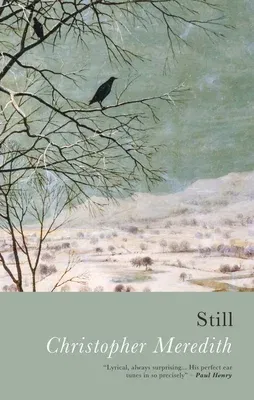Many though not all of the poems in Christopher Meredith's collection,
Still, explore the web of meanings in the word 'still'. They meditate
on the paradoxes of stillness and motion, on the capacity of memory and
imagination to hold life apparently still and the struggle in art to
achieve the power implicit in that to connect with the things of the
world in a contemplative intensity.
The distillation of a recurring memory of an old man in the title poem
becomes simultaneously an intensification of reality and a denaturing of
it. Horseshoe crabs on a nesting beach in New England have reached their
biological niche, at an evolutionary standstill for millions of years,
but live in blind struggle. A Victorian engraver loses his mind
attempting to fix his changing native Cornwall forever in his
illustrations. In 'Standing room', in entering the still room, the
stanza, of a poem, we enter a fixity in which we ourselves, as authors
or readers, become transient onlookers. Breughel's winter paintings
invite us both to enter a timelessly frozen world and to understand its
liquidity which we both observe and are part of.
In the closing sequence, 'Still air', which grew from a collaboration
with visual artist Sara Philpott and which focuses tightly on a small
landscape in the Usk Valley, the multiple, complex, endlessly moving
parts of nature in the stars, geology, the seasons, days, moments, are
overlaid and integrated with a clarity of vision that may be achieved in
moments of perhaps illusory but necessary stillness in a way that's
ultimately affirmative. Such moments of apparent stillness in these and
others of the poems became apertures through which to apprehend the
contrasted dynamisms of the world.
Still builds on Meredith's previous collection, Air Histories,
shifting between the personal and impersonal, developing a
characteristically wide range of forms, techniques, settings and moods
from quirky to serious, while increasingly an underlying coherence of
vision emerges. Many of the poems feature Welsh landscapes and settings,
in common with much of the author's previous work.

